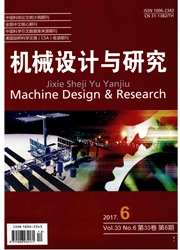

 中文摘要:
中文摘要:
服役零件疲劳寿命的预测与评估是装备高质量运行的前提。为准确预测服役零件的剩余寿命,基于磁记忆检测方法探索影响零件剩余寿命的参数,建立剩余寿命预测的新方法。以汽车车桥桥壳为对象,通过ABAQUS对服役零件进行疲劳寿命模拟分析,识别零件的疲劳危险区域;借助金属磁记忆检测技术和断裂力学理论,提取零件疲劳危险区中表征疲劳损伤程度的裂纹长度、应力强度因子、磁记忆信号法向分量梯度最大值、应力集中度等作为参数;引入支持向量机(SVM)理论,建立零件的剩余寿命预测模型。结果表明:SVM模型具有较高的预测精度,预测值与疲劳试验实测剩余寿命值相比误差不超过10%;预测精度同时受到零件损伤程度、训练样本数量、载荷大小和输入特征参数等的影响;建立的方法能够有效应用于低载荷高周疲劳下的桥壳等服役零件的剩余寿命预测。
 英文摘要:
英文摘要:
The prediction and assessment of residual life for serviced parts is the premise of equipment in high quality service. In order to accurately predict the residual life for the parts in service, this study focuses on the parameters affecting the residual life of parts based on magnetic memory testing, and presents a novel method predicting its residual life. Firstly, fatigue dangerous zones are identified and take the driving axel housing as the research object based on the simulation analysis and calculation under ABAQUS. Secondly, in the dangerous zone, the crack length charactorized the fatigue damage degree, the stress intensity factor, the normal component gradient maximum value of magnetic memory Signal and the degree of stress concentration are served as the parameters by means of metal magnetic memory testing technique and fracture mechanics theory. Thirdly, a regression theory of support vector machine (SYM) is introduced, and the prediction model of residual life about the parts is established. It shows SYM prediction model further improve the prediction accuracy and the error comparison of the prediction value and the experiment value is less than 10%. The degree of damage for parts, the numbers of training samples, the amplitude of loading and the inputs of model have impact on the accuracy of model output. In addition, under low-load and high-cycle fatigue, the proposed method can be effectively applied to predict the residual life of the significant part, such as drive axle housing in servise.
 同期刊论文项目
同期刊论文项目
 同项目期刊论文
同项目期刊论文
 期刊信息
期刊信息
